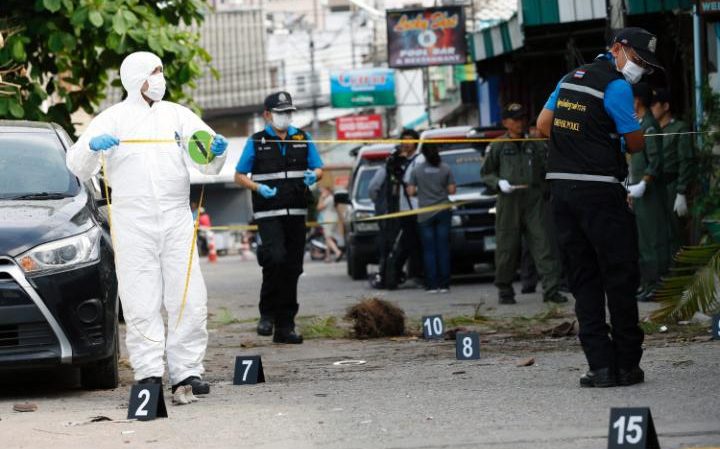-
Tips for becoming a good boxer - November 6, 2020
-
7 expert tips for making your hens night a memorable one - November 6, 2020
-
5 reasons to host your Christmas party on a cruise boat - November 6, 2020
-
What to do when you’re charged with a crime - November 6, 2020
-
Should you get one or multiple dogs? Here’s all you need to know - November 3, 2020
-
A Guide: How to Build Your Very Own Magic Mirror - February 14, 2019
-
Our Top Inspirational Baseball Stars - November 24, 2018
-
Five Tech Tools That Will Help You Turn Your Blog into a Business - November 24, 2018
-
How to Indulge on Vacation without Expanding Your Waist - November 9, 2018
-
5 Strategies for Businesses to Appeal to Today’s Increasingly Mobile-Crazed Customers - November 9, 2018
Four dead as string of blasts hit Thai tourist resorts
Thai Prime Minister Prayuth Chan-ocha hinted that political opponents of the military junta could be behind the attacks. Police have similarly refused to call the August 2015 bombing at a Bangkok shrine, which killed 20 people, a terrorist attack. No suspect has been found yet, but the suspicion could fall on groups fighting an insurgency in Muslim-majority provinces. He said a Samsung cellphone had been recovered that they believe was used to detonate at least one of the bombs.
Advertisement
“This tragic incident will serve as a constant reminder to the Thai people that there are some malicious people in our society and in Thailand, who have perpetrated these acts since before our referendum day and now on one of the most important days for our nation”, he added later in a televised address on Friday evening.
The first bomb exploded in the southern province of Trang – an area full of handsome beaches and tourist islands – killing one person and injuring six, according to police.
“My assessment is that this whole operation was targeted on one thing: Thailand’s tourist economy”, said Anthony Davis, a security analyst at IHS Jane’s.
Eleven foreigners were wounded in the blasts, including nationals of Austria, Germany, Italy and the Netherlands.
Two blasts also occurred in Surat Thani yesterday where one person died, and a blast at a market in Trang two days ago also claimed a life.
Mr Wiek said later explosions in Hua Hin were also at a popular tourist spot, this time a clock tower where bus and taxi day trips run from.
He said the government would look after the safety of all diplomats and foreigners in the country and fully care for those affected.
General Sithichai Srisopacharoenrath, the superintendent of police in Hua Hin, said the bombs were hidden inside potted plants and set off by remote control, half an hour apart.
At 3 p.m., a bomb went off at Center Point Market in Trang province’s Muang district, killing one and injuring at least six others.
Friday is the birthday of the queen, Sirikit, a national holiday, and some of the bombs were reported to have gone off after the national anthem, which is customarily played at 8 a.m. The second blast kills one woman and injures 21.
The explosions Thursday night in Hua Hin, which occurred about a half-hour apart, were in an area of bars and nightclubs popular with foreign tourists. “Everyone was screaming, the glass broken, table broken, confusion”, the Italian said Friday from a Hua Hin hospital bed, a place he never expected to turn 51.
Tour guide Niels Seeberg had come across the first blast site earlier in the night, and thought it might be a gas explosion. So he and his friends continued on to a venue where a live band was playing. “Now we don’t think it’s amusing anymore”, said Buuz, as bomb-sniffing dogs patrolled nearby beaches.
Historically the country has faced political volatility, largely driven by a perceived divide between populists – or the so-called “Red shirts”, many of whom live in rural areas and are poor – and the urban middle class and elite in Bangkok – often referred to as “Yellow shirts” – who tend to back the Thai monarchy. “People were shocked, they couldn’t say anything”.
Thailand’s military government will undoubtedly probe its primary political rivals, namely the opposition Pheu Thai party it ousted in a 2014 coup and their “Red Shirt” supporters in the north and northeast.
Fears that followers of former Prime Ministers Thaksin Shinawatra and his sister Yingluck Shinawatra, including an opposition movement sympathetic to the Shinawatras known as the “red shirts”, could be blamed prompted a senior figure in their Puea Thai Party to issue a sharp denial.
Advertisement
“It’s been years since they have been able to pull off coordinated attacks across multiple cities and provinces, and when they have, it’s always been confined to the deep south”, he said in an e-mail.





























